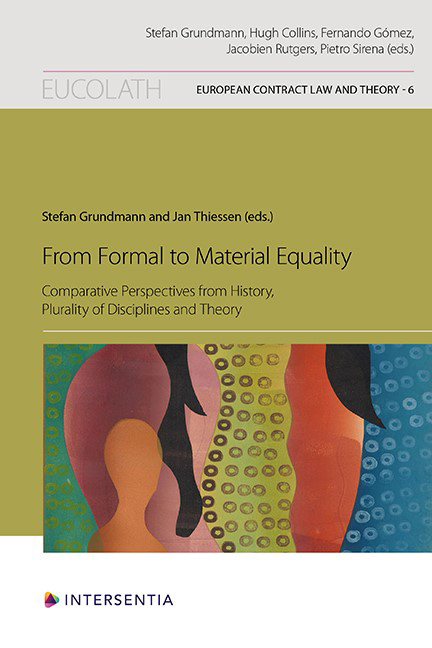 From Formal to Material Equality
From Formal to Material Equality Book contents
- Frontmatter
- Contents
- List of Authors
- From Formal to Material Equality: Key Insights from History and in a Multidisciplinary Perspective
- The Same Human Nature: Some Approaches to Equality in Law
- Two Centuries of Private Law Theory on Formal and Material Equality
- Equal Dignity of Human Beings: The Philosophical and Methodological Foundations of Private Law
- Equality Between Efficiency and Distribution: A Law and Economics Reconceptualisation of a Principle of Justice
- Dimensions of Equality in Private Law: Translating between Law, Society and Technology
- Index
- European Contract Law and Theory Series
Two Centuries of Private Law Theory on Formal and Material Equality
Published online by Cambridge University Press: 15 November 2023
- Frontmatter
- Contents
- List of Authors
- From Formal to Material Equality: Key Insights from History and in a Multidisciplinary Perspective
- The Same Human Nature: Some Approaches to Equality in Law
- Two Centuries of Private Law Theory on Formal and Material Equality
- Equal Dignity of Human Beings: The Philosophical and Methodological Foundations of Private Law
- Equality Between Efficiency and Distribution: A Law and Economics Reconceptualisation of a Principle of Justice
- Dimensions of Equality in Private Law: Translating between Law, Society and Technology
- Index
- European Contract Law and Theory Series
Summary
Two centuries of private law theory concerning formal and material equality: such a title suggests a rather optimistic perspective regarding the development of the concepts of equality in modern private law thinking. Drawing upon the work of Franz Wieacker, this narrative suggests a historical development in which formal equality continuously progresses towards an ever-greater level of material equality, a development that continues along this path until a legal state of actual equality and freedom from discrimination is achieved in private law.
The following analysis will put the viability of this narrative to the test. On the one hand, it seems to find ample support in the development of the principle of equality in private law during the past two centuries. On the other hand, the newest developments show that we might have reached a turning point, and possibly even a dividing line. In recent times, the trend towards constitutionally anchored equality in private law has run into serious conflict with fundamental structures of private law.
In section one of this chapter, I will define and explain the concepts of formal and material freedom, as well as formal and material equality and justice. On this basis, I will reconstruct the relationship between freedom and equality in private law, stemming from Enlightenment thinking ( section 2 ). The next section identifies the historical and theoretical establishment of general formal equality as the first level of equality in private law ( section 3 ). The following part distinguishes general formal equality from a second level of special principles of equal treatment and the more recent anti-discrimination law that has emerged within private law ( section 4 ). Finally, this analysis concludes by asking whether a general principle of equal treatment under private law can be derived from these developments; one which no longer represents an exception requiring justification, but has instead become the rule, even in private law relationships guided by private autonomy.
CONCEPTUAL FOUNDATIONS: FORMAL AND MATERIAL FREEDOM AND EQUALITY
In order to approach the question whether there is now a general principle of equal treatment under private law, it is first necessary to clarify the conceptual foundations of private law thinking about equality.
- Type
- Chapter
- Information
- From Formal to Material EqualityComparative Perspectives from History, Plurality of Disciplines and Theory, pp. 63 - 80Publisher: IntersentiaPrint publication year: 2023
